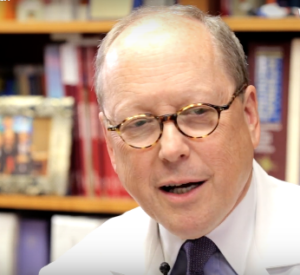 Editor’s note: Rheumatologists who are outstanding researchers, educators and/or clinicians, who provide consistently exceptional care to patients, have achieved a level of distinction in the field and serve as role models for colleagues and trainees are highlighted in this recurring series.
Editor’s note: Rheumatologists who are outstanding researchers, educators and/or clinicians, who provide consistently exceptional care to patients, have achieved a level of distinction in the field and serve as role models for colleagues and trainees are highlighted in this recurring series.
Be curious. Listen to your patients. Demonstrate empathy. These traits, according to Herbert S.B. Baraf, MD, FACP, MACR, are just some of the characteristics demonstrated by expert clinicians. And he should know.
Dr. Baraf is a founding member and former managing partner of Arthritis and Rheumatism Associates (ARA), the country’s largest private practice rheumatology group. He is a clinical professor of medicine at The George Washington University School of Medicine, Washington, D.C., and a clinical associate professor of medicine at the University of Maryland School of Medicine, Baltimore. Dr. Baraf founded the Center for Rheumatology and Bone Research, ARA’s research division, and has served as a principal investigator on more than 350 clinical trials studying new treatments for more than a dozen rheumatic disorders including gout, rheumatoid arthritis, systemic lupus, Sjögren’s disease, osteoporosis, psoriatic arthritis and osteoarthritis.
A nationally recognized authority on issues of rheumatology practice management, Dr. Baraf has lectured throughout the U.S. on topics of practical importance to practicing rheumatologists. In 2014 he was honored by the ACR with the Paulding Phelps Award for his contributions to patient care, rheumatology and the practice of medicine.
The Rheumatologist (TR): In your opinion, what makes for an expert clinician?
Dr. Baraf: An expert clinician is a physician who has a depth of experience, is extremely intellectually curious, is adept at truly listening to patients, demonstrates empathy, understands the science underpinning key concepts in medicine, is up to date on current therapeutics and research, and is honest about what he or she does and does not know.
Building knowledge through experience, in my view, is one of the most important habits. When I was a 28-year-old, first-year rheumatology fellow on rounds with my attending, I started to discuss my views on a patient’s diagnosis and management by using the phrase, ‘In my experience …’ My attending stopped me right there.

Dr. Baraf
‘In your experience?’ he asked. He noted that I had not yet had the opportunity to develop such experience and that it would take time to benefit from years of working with and treating patients.
Now, much deeper into my medical career, I understand that observing the natural history of disease, reflecting on successes and failures in medical management, and following patients over time allow a clinician to have a broad-based perspective and better see the entire picture.
TR: Who were some of your clinician role models, and what qualities did you admire in these individuals?
Dr. Baraf: Raymond Scalettar, MD, DSc, FACP, is one of the people who most impresses me with his unrelenting intellectual curiosity. I have known him for several decades, and to this day at age 93, he frequently sends me emails with thoughts on medicine, public health and current events. He does not think of medicine as a 9–5 job, but as a calling and a passion. He cares about patients, and he cares about making the right decisions with patients.
Ludwig Eichna, MD, is another physician I greatly admired. After an illustrious career in academic medicine and after retiring from his position as chair of the Department of Medicine at SUNY Downstate Medical Center, Brooklyn, N.Y., in 1974, Dr. Eichna entered Downstate as a medical student, completed the program and was awarded a second medical degree in 1979. He was inspired to do this to better understand the advances in medical education and knowledge that had accrued in the years since his original medical school education. He wrote brilliantly and thoughtfully on the lessons he learned as a second-time medical student and published these reflections in the New England Journal of Medicine in 1980. His insights were prescient and, amazingly, are still relevant today—more than 40 years since his writings were published.
Norman Koval, MD, was another one of my role models. He was one of the founders of my practice and was a clinical rheumatologist for four decades in the Washington, D.C., area. From Norman, I learned what it means to be interested in, and skilled at, managing a medical practice, understanding business and being actively engaged in the clinical practice of medicine.
TR: What are some of the challenges to developing skills in clinical excellence that one may encounter in the private practice setting?
Dr. Baraf: In the world of private practice, a physician must develop an understanding of how to run a successful small business. They must be adroit at managing payroll, understanding reimbursement, staying up to date on policy changes that affect the practice and ensuring that all physicians and staff work together well as a team. Most of us physicians don’t want to be bothered by understanding the business of medicine, but this is essential in private practice.
At the same time, one must juggle these responsibilities with the goal of staying up to date on the medical literature and continuing to develop clinical reasoning and diagnostic skills. Having a curious and restless mind can be helpful in achieving all of these goals, and staying productive is also important.
A colleague in our practice has spent roughly half his career in academic medicine and the other half in private practice. He noted to me that one is not an expert on medical subject matter because they are asked to write a book chapter; rather, one becomes an expert through the process of writing the chapter. You have to do the work to reap the benefits in terms of knowledge.
TR: How do you manage to stay up to date on the medical and scientific literature and cutting-edge research in rheumatology?
Dr. Baraf: I’ve been involved in clinical trials since the start of my clinical practice. This has helped significantly in allowing me to remain abreast of the latest developments in the field, especially with respect to topics that relate to these trials. One cannot know everything about everything, but a clinician can know a little about a lot of things and can also, in some cases, know a lot about a specific set of topics.
I have been very involved in the study of gout, and this has allowed me to remain up to date on the topic and even to lecture to colleagues.
I feel it is very important to be involved in the exchange of ideas through lectures, conferences and other scholarly venues. I try to share what I know with others who can use this information the most, such as medical students and trainees, and my fellow rheumatologists, who are doing outstanding work treating patients.
I must also say that the landscape of medical research updates has changed dramatically over the course of my career. It used to be the case that rheumatologists would learn about most updates from one or two main conferences each year, but now there are new data being received in email alerts and through online publications every week. I am a multi-tasker and enjoy handling many things at once, and I believe this trait has allowed me to stay current when it comes to the medical literature.
TR: How do you approach the concept of uncertainty when entertaining a diagnosis for a patient?
Dr. Baraf: Uncertainty comes with the territory in rheumatology. I had a professor of pathology in medical school who made a point of catching students who were bluffing, fabricating answers and hand-waving in response to his questions. He would scold the student and say, ‘You don’t know the answer to the question, and you should admit as much.’
One must recognize the limits of one’s own knowledge and be honest about uncertainty.
We live in an era in which nearly any fact is available through the Web, but simply knowing facts is not what we do as clinicians. Rather, we form our clinical opinions from speaking with and evaluating patients. We get the opinions of colleagues. We synthesize information, and, if you truly care about the patient, we share this process with the patient.
I try not to be afraid to say, ‘I don’t know.’
The best thing about being in a practice like mine is that I can bring colleagues into the room with me and the patient—I do this at least two or three times per week to bounce ideas off my partners. I believe patients appreciate this honesty and collaboration, and I think it leads to the best outcomes for patients.
 Jason Liebowitz, MD, is an assistant professor of medicine in the Division of Rheumatology at Columbia University Vagelos College of Physicians and Surgeons, New York.
Jason Liebowitz, MD, is an assistant professor of medicine in the Division of Rheumatology at Columbia University Vagelos College of Physicians and Surgeons, New York.

